


Tuberculosis is a disease caused by a bacteria that usually affects your lungs. The TB bacteria passes easily from one person to another through droplets in the air when someone who has an active TB infection coughs, speaks, or sneezes.
Tuberculosis is a disease caused by infection with the bacterium Mycobacterium tuberculosis. The most common form of the disease is pulmonary tuberculosis, which affects the lungs. Other forms of the disease include extrapulmonary tuberculosis, which can affect any other organ in the body.
Symptoms of tuberculosis include cough, fever, weight loss, and night sweats. Tuberculosis is diagnosed by a skin test or chest X-ray. Treatment for the disease usually involves a combination of drugs taken for several months.
Most people who are infected with Mycobacterium tuberculosis do not develop symptoms of the disease. This is because their immune system is able to keep the bacteria under control. However, some people's immune systems are unable to prevent the bacteria from multiplying, and they develop active tuberculosis. Active tuberculosis is contagious and can be spread from person to person through coughing or sneezing.
People with active tuberculosis must be treated to prevent them from spreading the disease to others. People who have been exposed to someone with active tuberculosis may need to be screened for latent infection and treated if necessary.
There are two types of tuberculosis: latent and active.
Mycobacterium tuberculosis is the bacteria that causes tuberculosis. The bacteria are spread through the air, and most people who become infected with the bacteria do not get sick. However, some people develop active TB disease. Active TB disease occurs when the bacteria begin to multiply in your body and cause symptoms.
Tuberculosis (TB) is a disease caused by bacteria that usually attack the lungs. It can also affect other parts of the body, such as the brain, kidneys, and spine. TB is spread through the air when a person with TB of the lungs or throat coughs, sneezes, or talks. People nearby could inhale these bacteria and acquire an infection.
Most persons who contract TB bacteria do not develop any symptoms. This is because the body’s immune system is able to fight off the TB bacteria. However, some people cannot fight off the TB bacteria because their immune system is weak from another illness or condition, such as HIV/AIDS, diabetes, certain cancers, or long-term steroid use. When this happens, the TB bacteria begin to multiply and make the person sick.
Tuberculosis is spread when an infected person coughs or sneezes and another person inhales the bacteria. The bacteria can also be spread through close contact with an infected person, such as shaking hands or sharing a drinking glass. It is not easy to catch tuberculosis. Most people who are exposed to the bacteria do not become sick.
The most common symptom of active tuberculosis is a cough that lasts more than three weeks. Other symptoms include:
There are two types of tests that are used to diagnose tuberculosis: the tuberculin skin test and the TB blood test.
The TB Gold test is the most commonly used test for diagnosing tuberculosis. It involves injecting a small amount of liquid into the skin on your arm. If you have been infected with the TB bacteria, you will develop a raised, hard bump at the injection site within 48 to 72 hours.
The TB blood test is not as commonly used as the tuberculin skin test, but it can be useful if you have a negative reaction to the skin test or if you have certain medical conditions that make it difficult to interpret the results of the skin test. The TB blood test looks for antibodies that your body has produced in response to the TB bacteria.
Treatment for tuberculosis generally involves a long course of antibiotics. The specific antibiotics and length of treatment depend on the individual's age, overall health, and type of TB. Treatment usually lasts six to nine months.
In most cases, TB can be cured with a regimen of four different drugs over six to nine months. These medications include ethambutol (EMB), pyrazinamide (PZA), rifampin (RIF), and isoniazid (INH).
If you have latent TB infection, your doctor may prescribe just one or two drugs, depending on which drugs are likely to work best for you and whether you have any risk factors for progressing to active TB disease. The two most common drugs used to treat latent TB infection are isoniazid and rifapentine (Priftin®). Treatment usually lasts nine months.
Tuberculosis is a serious infectious disease that can be deadly if not treated properly. It is important to know how to prevent tuberculosis so you can protect yourself and others from this potentially deadly illness.
There are a few things you can do to help prevent the spread of tuberculosis:
If you think you may have been exposed to someone with TB, it's important to see a doctor right away so you can be tested and treated promptly if necessary. Early diagnosis and treatment are crucial to preventing the spread of tuberculosis and saving lives.
Tuberculosis is a deadly disease that kills millions of people each year. The only way to prevent it is through vaccination. The vaccine to prevent tuberculosis is called the BCG vaccine. It is given to infants and young children around the world. The vaccine is safe and effective, but it does not work for everyone.
As the world’s leading cause of death from a single infectious agent, tuberculosis (TB) claim 1.3 million lives each year. Although TB is preventable and curable, progress in tackling the disease has been slow. In 2016, only 6 percent of the 10.4 million people who fell ill with TB were treated with the most effective drugs.
A vaccine for TB has been available since the early 1900s, but it is not widely used because it is not very effective. The Bacille Calmette-Guérin (BCG) vaccine offers some protection against severe forms of TB in young children, but its efficacy wanes over time.
New vaccines are needed to address the global TB epidemic. Recently, scientists have made significant progress in developing more effective vaccines against TB. In preclinical studies, new vaccine candidates have shown promise in protecting against both infection and disease. These vaccines are currently in clinical trials and could potentially be available for use in the next few years.
If you have any questions about tuberculosis or vaccination, please consult your healthcare provider.
The first stage of tuberculosis (TB) is called primary TB. It usually happens soon after a person becomes infected with TB bacteria.
Symptoms of tuberculosis (TB) can start any time from a few weeks to several months after infection. It usually takes longer for symptoms to appear in people with latent TB infection.
Tuberculosis (TB) is caused by a bacterium called Mycobacterium tuberculosis. The bacteria usually attack the lungs. Cigarette smoking is one of the most important risk factors for developing active TB disease.
TB cough is Dry and persistent in nature.
If you have chest pain and you are coughing up blood then it can be tuberculosis.
While it is possible to check for TB at home, you can select a Tuberculosis test by visiting Max lab website and book a home sample collection appointment.
The most important thing you can do to prevent tuberculosis is to get vaccinated.and identify people with active tuberculosis and isolate them from others to prevent the spread of the disease
The first line of treatment for TB is usually a combination of antibiotics. These drugs are taken for six to nine months, and they must be taken exactly as prescribed.
 Allergy Test
Allergy Test
 Anemia Test
Anemia Test
 Auto immune
Auto immune
 Blood disorder
Blood disorder
 Bone and Joint
Bone and Joint
 Cancer Test
Cancer Test
 Cardiology Test
Cardiology Test
 Covid Recovery
Covid Recovery
 Dengue Test
Dengue Test
 Depression
Depression
 Diabetes Test
Diabetes Test
 Fatigue
Fatigue
 Fever Test
Fever Test
 Full body
Full body
 Gastro Test
Gastro Test
 Gastrointestinal
Gastrointestinal
 Gynaecology Test
Gynaecology Test
 Heart Test
Heart Test
 HIV Test
HIV Test
 Hormone Test
Hormone Test
 Hypertension
Hypertension
 Immunity Test
Immunity Test
 Infectious Disease
Infectious Disease
 Infertility Test
Infertility Test
 Influenza Test
Influenza Test
 Iron Test
Iron Test
 Kidney Test
Kidney Test
 Liver Test
Liver Test
 Lung Test
Lung Test
 Nephrology
Nephrology
 Obesity
Obesity
 Orthopedics Test
Orthopedics Test
 Physician
Physician
 Pollution Health Checkup
Pollution Health Checkup
 Pregnancy Test
Pregnancy Test
 Prostate Test
Prostate Test
 Senior Citizen Test
Senior Citizen Test
 STD Test
STD Test
 Thyroid Test
Thyroid Test
 Tuberculosis Test
Tuberculosis Test
 Vitamin Test
Vitamin Test
 Women Health Test
Women Health Test